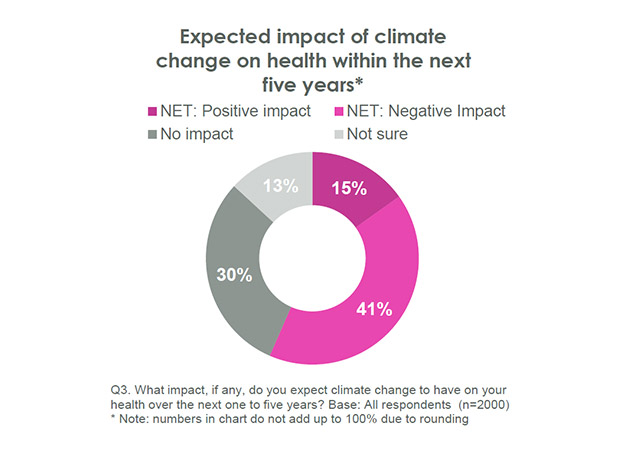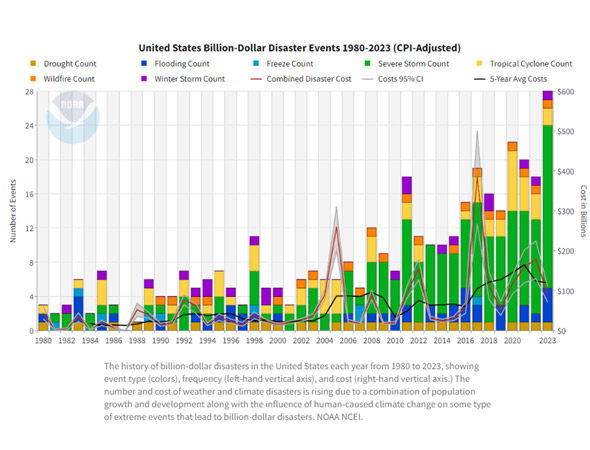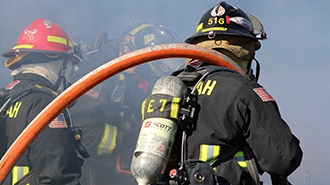Conversations around climate change and (re)insurance typically center around the impacts on the property market and, considering the destructive nature of natural catastrophes, this is not surprising. But as climate change accelerates, its impacts will not just be limited to one form of insurance.
While the effects of changing weather patterns are certainly less outwardly visible than on the property market, the accident and health insurance (A&H) market will also feel the effects of climate change across its eclectic lines of business – from the traditional A&H book to travel and supplemental health coverages.
With A&H coverages providing important forms of protection for the health and wellbeing of many segments of the population and organizations, the AXIS Global Accident & Health team is monitoring the effects of climate change on the evolving A&H risk landscape. To ensure the delivery of elevated, specialty solutions that continue to protect our customers and respond to their changing needs, it is prudent to consider how climate change could impact the A&H market and the coverages it provides now and in the future.

What to prepare for
According to the Society of Actuaries Research Institute, over half of Americans report that extreme weather events such as hurricanes, tornadoes, flooding, wildfires and heatwaves, have impacted their personal health, with 20% saying the impact was “significant”.1
The health issues reported included short-term injury or illness, complications to existing chronic conditions and, lastly, that extreme weather events have caused a long-term injury or a chronic condition.
Tellingly, two in five Americans, or 41%, expect climate change to have a negative impact on their health within the next five years.1
In the years ahead therefore, we can expect:
- More respiratory and transitory health impacts, along with cardiovascular and mental health issues caused by smoke exposure and the trauma of living with fire2
- An increase in incidences of tick-borne illnesses such as Lyme disease due to increased outdoor recreational activities where ticks are prevalent3
- More cases of heat cramps, heat exhaustion, heatstroke and hyperthermia caused by exposure to hotter than average conditions4
- Worsening air quality due to excessive heat promoting the formation of air pollutants, which exacerbate cardiovascular and respiratory problems such as asthma and bronchitis5
- Stress, trauma and distress caused by the increasing severity and frequency of extreme weather events and its consequences , stress and trauma of recovery – incorporate somehow
Climate change and A&H coverages

Travel
According to the National Oceanic and Atmospheric Administration (NOAA), 2023 was the worst year for billion-dollar weather and climate disasters in the US since record keeping began in 1980.6
The increase in extreme weather events is having an obvious impact on travel. Over the past few years, we have seen wildfires and floods inflict misery on popular travel destinations, their infrastructure, and unsuspecting tourists. The increase in severe weather events increases travel cancellations, medical costs while traveling in an affected area, and even evacuations.
Across Greece, devastating wildfires in July 2023 caused not only the evacuation of more than 20,000 tourists7, but mass cancellations of flights into the island of Rhodes 8.
Tragic wildfires that broke out in West Maui, Hawaii, in August 2023, saw 46,0009 people flying out of Kahului Airport in the space of a few days. In addition to needing treatment for fire-related medical issues, the fires also destroyed people’s prescriptions, leaving them without their essential medications.10

First responders
Due to the nature of their work, first responders consistently deal with the fallout from natural disasters. However, the increase in major climate events like hurricanes and wildfires, as well as hotter summer temperatures more generally, has marked a step change in their workload including longer shifts in more dangerous situations.
A November 2020 study by the National Library of Medicine found that “overall, there is an increased demand in urban fire and police services as daily maximum temperatures rise from ~80°F to over 100°F across the US”. It also cited research into the impacts of heat on emergency medical services and ambulance calls noting an increase in “violent, aggressive and impulsive behaviors and crime, fatal traffic accidents, cognitive function, sleep, and a myriad of health outcomes” and increasing the types of emergency situations that require police or fire department response12.

Student athletes
We’ve already seen the tragic impact of heat stroke on student-athletes and extreme heat is the leading cause of weather-related deaths in the United States.13 According to the National Center for Catastrophic Sport Injury research, heat stroke is the third most common cause of sudden death among high school athletes behind cardiac arrest and traumatic brain injuries.14 In a period of rapid climate change, practical measures must be taken to reduce the likelihood of heat-related tragedies among student-athletes.

The supplemental health market
According to the Environmental Protection Agency, climate change can impact the seriousness or frequency of people’s health problems and can present new or unanticipated health problems in people or places where they had not been before15.
For example, droughts create dust, which can lead to respiratory illness,16 while storms and floods can cause infections from contaminated water17. Health services disrupted by catastrophic events are a risk especially for people who need regular medical care such as those with chronic illnesses and pregnant women. Exposure to extreme or prolonged heat can cause exhaustion, heat stroke, kidney and heart disease and pregnancy complications.13
As climate-sensitive health risks become more prevalent, and new health risks to individuals caused by climate change arise, health insurance policies may have to start accommodating for these changing health risk patterns, as there is the potential that we will see revisions to traditional policies.

Pets
It’s not just humans whose health is affected by the consequences of climate change. Owners must also consider that their pets are also susceptible to heat stress during a heat wave or injury during a flood or hurricane, all of which can result in a visit to a veterinarian.
Hotter weather also puts animals at a higher risk of vector-borne diseases such as heartworm and Lyme disease18 since fleas, ticks and mosquitoes are no longer just confined to the traditional warm-weather months as spring now arrives earlier and fall later.
Another risk for cats and dogs is distemper, a highly contagious viral disease that often shows up after an event such as a hurricane, when animals are rescued and placed in shelters, in close proximity to others. They are also at risk from other viruses present in contaminated water to which they are particularly vulnerable after a flood18. These are all issues carriers must consider for pet insurance plans.
A&H Insurance Must Adapt
As A&H insurers it is essential that we model for the effects of climate change across our portfolios and ensure that our specialist coverage remain responsive, relevant and essential to the diverse and evolving needs of our many customer groups.
1 https://www.soa.org/4aa97a/globalassets/assets/files/resources/research-report/2023/2023-climate-risk-survey.pdf
2 https://www.soa.org/4af933/globalassets/assets/files/resources/research-report/2023/wildfires-impact-ushealth-lifeinsurers.pdf
3 https://www.soa.org/4aa97a/globalassets/assets/files/resources/research-report/2023/2023-climate-risk-survey.pdf
4 https://www.who.int/news-room/fact-sheets/detail/climate-change-heat-and-health#:~:text=Rapid%20rises%20in%20heat%20gain,exhaustion%2C%20heatstroke%2C%20and%20hyperthermia
5 https://www.soa.org/4a7ddf/globalassets/assets/files/resources/research-report/2023/exccessive-heat-essay-gutterman.pdf.
6 https://www.climate.gov/news-features/blogs/beyond-data/2023-historic-year-us-billion-dollar-weather-and-climate-disasters
7 https://www.reuters.com/world/europe/dozens-patients-evacuated-greece-wildfires-burn-fourth-day-2023-08-22/
8 https://www.pbs.org/newshour/world/wildfires-heat-waves-deliver-blow-to-southern-europes-vital-tourism-industry#:~:text=For%20Greece%20as%20a%20whole,travel%20figures%2C%20HotelPlanner's%20Hentschel%20said
9 https://www.theguardian.com/us-news/2023/aug/14/maui-fires-hawaii-tourists-hotel-fire-evacuation-wildfires
10 https://www.cbsnews.com/news/maui-wildfire-survivors-left-without-life-saving-medicine-doctor-cory-lehano-stepped-up-provide-them-for-free/
11 https://www.cnbc.com/2023/08/13/gen-z-millennials-are-most-likely-to-buy-travel-insurance-products.html
12 https://www.ncbi.nlm.nih.gov/pmc/articles/PMC7648134/
13 National Weather Service. (2020). Weather related fatality and injury statistics. Retrieved 3/22/2022.
14 https://www.espn.com/espn/story/_/id/38122126/extreme-heat-poor-air-quality-raises-concerns-young-athlete-safety
15 https://www.epa.gov/climateimpacts/climate-change-and-human-health
16 Ebi, K.L., et al. (2018). Ch. 14: Human health. In: Impacts, risks, and adaptation in the United States: Fourth national climate assessment, volume II. U.S. Global Change Research Program, Washington, DC, p. 544
17 EPA. (2021). Understanding the connections between climate change and human health. Retrieved 3/22/2022.
18 https://www.climaterealityproject.org/sites/default/files/climatechangeandyourpet_ebook_04_2019_v2.pdf

